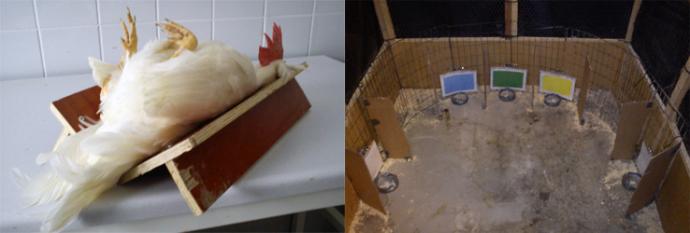Methods
Three groups of White Leghorn chickens were exposed to a six-day long stress protocol at different ages, namely during second week of life (juvenescence), during eighth week of life (early adolescence), and during seventeenth week of life (late adolescence). The stressors that were used were food frustration, restraint and social isolation. Each of the stressors were applied on two days each.
Directly after respective stress treatment, the short-term effects were studied with an undisturbed behaviour observation, a novel object test and a tonic immobility test. Birds were also weighed before and after the stress week. The long-term effects were studied when the chickens were adults with an associative learning test and, once again, a tonic immobility test.


Responsible for this page:
Director of undergraduate studies Biology
Last updated:
05/19/13
